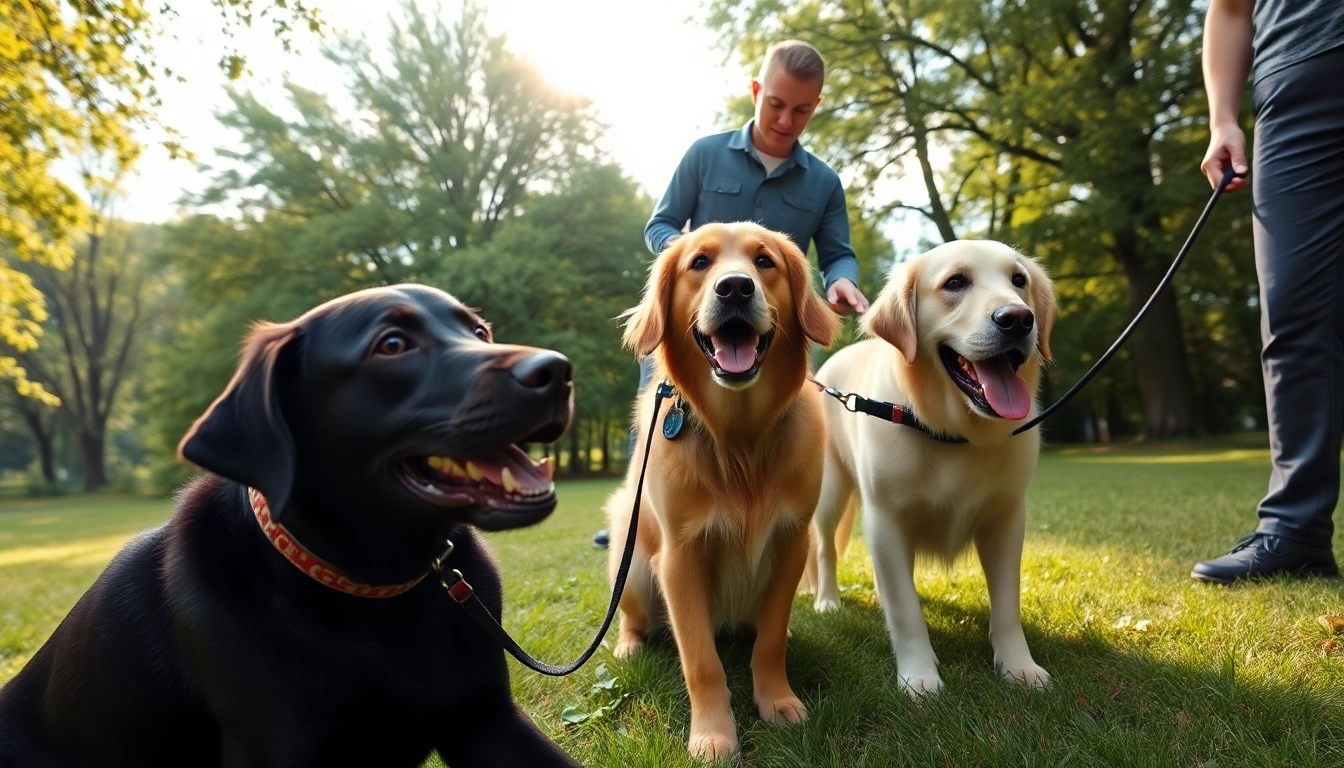
Understanding Psychiatric Service Dogs
Definition and Purpose of Psychiatric Service Dogs
Psychiatric service dogs (PSDs) are specially trained canines that assist individuals with mental health conditions. Unlike emotional support animals, which provide comfort through companionship, psychiatric service dogs are trained to perform specific tasks that help their handlers cope with the symptoms of their disabilities. These tasks may include alerting a person to an impending anxiety attack, providing deep pressure therapy during episodes of distress, or guiding them through overwhelming social situations. The unique capability of these dogs not only aids in managing psychiatric disorders but also improves the quality of life for those affected.
Key Benefits of Having a Psychiatric Service Dog
The benefits of having a psychiatric service dog are manifold. Firstly, these dogs provide practical support, helping individuals navigate everyday challenges. For instance, they may help their owners stay calm in crowded places, remind them to take medication, or create a physical barrier in social situations that may cause anxiety. Secondly, having a psychiatric service dog can significantly enhance emotional well-being. The companionship and unconditional love provided by these dogs can lessen feelings of loneliness and depression. Furthermore, the bond developed between the handler and the dog fosters a sense of responsibility and purpose, which can be crucial for overall mental health.
Different Types of Psychiatric Disabilities Addressed
Psychiatric service dogs are utilized for a variety of mental health conditions. Common disorders that can benefit from a PSD include:
- Post-Traumatic Stress Disorder (PTSD): Dogs can help individuals redirect their focus during flashbacks or reminders of traumatic events.
- Anxiety Disorders: PSDs can create a calming presence during panic attacks and anxiety episodes.
- Depression: Dogs encourage daily activity, providing motivation through companionship.
- Bipolar Disorder: PSDs can assist in recognizing mood swings and providing grounding when necessary.
- Obsessive-Compulsive Disorder (OCD): They can interrupt compulsive behaviors or provide anxiety-reducing support.
Training and Certification for Psychiatric Service Dogs
Essential Training Requirements for Psychiatric Service Dogs
Training a psychiatric service dog involves a rigorous process that is crucial for their effectiveness. The training focuses on specific tasks that the dog must perform to assist their handler. Essential training components include:
- Basic Obedience: Commands such as sit, stay, and come are fundamental for any service dog.
- Task Training: This includes specific tasks related to the handler’s needs, like deep pressure therapy or retrieving medication.
- Socialization: PSDs must be exposed to a variety of environments and situations to ensure they remain calm and focused.
- Behavioral Training: Dogs are taught to behave appropriately in public settings, maintaining focus on their handler amid distractions.
Certification Process for Psychiatric Service Dogs
The process of certifying a psychiatric service dog varies by region. In general, certification is not legally required, but it helps in verifying the dog’s training and suitability. Typically, handlers pursue certification through organizations that specialize in service dogs. These organizations evaluate the training and behavior of the dog to ensure they meet established standards. Obtaining certification can provide added assurance for public access rights, making it easier for handlers to navigate spaces that accommodate service animals.
Finding Qualified Trainers for Psychiatric Service Dogs
Finding a qualified trainer is crucial for the successful development of a psychiatric service dog. Look for trainers with specific experience in service dog training. Resources for locating trainers include:
- Certification through recognized organizations, which indicates a commitment to ethical training practices.
- Referrals from mental health professionals who understand the needs of individuals with psychiatric conditions.
- Online reviews and testimonials from previous clients.
The trenchant trainer will take the time to understand both the needs of the dog and the specific requirements of the handler.
Where to Find Psychiatric Service Dogs for Sale
Reputable Breeders of Psychiatric Service Dogs
When searching for psychiatric service dogs for sale, it is essential to find reputable breeders who specialize in training dogs for service roles. Key factors to consider include:
- Breeder Credentials: Verify the breeder’s experience and success in breeding dogs for service work.
- Health Screening: Reputable breeders conduct health screenings for common genetic issues, ensuring the long-term health of their dogs.
- Training History: Ensure the dog has been trained appropriately and is suitable for service work.
Adoption Options for Psychiatric Service Dogs
Adopting a psychiatric service dog is another option for individuals seeking support. Many organizations focus on rescuing and training suitable dogs for service roles. Look for shelters or service dog organizations that offer adoption services, ensuring they have a comprehensive training program that prepares dogs for the specific needs of their future owners. Various local and national organizations can provide resources on potential adoption options.
Evaluating a Service Dog’s Suitability
Before bringing a service dog home, it’s crucial to evaluate their suitability. Factors to consider include:
- Temperament: A service dog must exhibit calm behavior, friendliness, and focus. Hyperactivity or aggression is a disqualifying trait.
- Energy Levels: Ensure the dog’s energy levels match your lifestyle. They should be willing to engage but have the self-control needed for service work.
- Adaptability: The dog should be comfortable in varying public environments and able to adjust to change.
Understanding the Costs Involved in Purchasing Psychiatric Service Dogs
Factors Influencing the Cost of Psychiatric Service Dogs
The costs associated with acquiring a psychiatric service dog can vary widely based on several factors:
- Training Level: Fully trained dogs tend to cost more, especially if they have undergone extensive specialized training.
- Breed: Some breeds are more commonly trained as service dogs, which can affect availability and pricing.
- Location: Prices can vary depending on geographical regions and the availability of reputable service dog breeders or training organizations.
Financial Assistance Options for Buying Psychiatric Service Dogs
Financial barriers should not limit access to the therapeutic benefits of psychiatric service dogs. Various organizations offer assistance for individuals seeking to acquire a service dog. Options include:
- Grants: Some non-profits provide grants that can be applied to service dog training and adoption costs.
- Fundraising: Personal crowdfunding campaigns can effectively raise funds to cover expenses related to service dog acquisition.
- Payment Plans: Many service dog training organizations offer installment plans to help manage payments over time.
Long-term Investment: Maintenance and Care Costs
Investing in a psychiatric service dog involves more than just the initial purchase or adoption fees. Ongoing costs must be considered, including:
- Veterinary Care: Routine check-ups, vaccinations, and any necessary medical treatments contribute to the overall expenses.
- Food and Supplies: High-quality dog food and supplies, including leashes, collars, and training equipment, are essential for a dog’s health and well-being.
- Training Refreshers: Periodic training refreshers can help maintain the dog’s skills and adaptability to emerging needs.
Legal Rights and Considerations for Psychiatric Service Dogs
Understanding Legal Protections for Psychiatric Service Dogs
Handlers of psychiatric service dogs have specific legal protections under the Americans with Disabilities Act (ADA). These laws allow service dogs access to public places where pets are usually prohibited. Understanding your rights can help ensure that you and your service dog can navigate society without unnecessary complications.
Access Rights in Public Spaces for Psychiatric Service Dogs
It’s important to know that psychiatric service dogs are granted access to public spaces, including restaurants, stores, and transit systems. However, it’s advisable to prepare for encounters with individuals who may question your dog’s status. Carrying documentation, such as a letter from your therapist supporting the need for a service dog, can be beneficial in these situations.
Handling Challenges with Service Dog Acceptance
While the law provides rights for service dog handling, challenges can still arise. Some individuals may refuse to acknowledge the legitimacy of a psychiatric service dog. Having an understanding of your rights and remaining calm and polite in these interactions can often help de-escalate tensions. Being well-informed of the specific policies and guidelines for service dogs can empower handlers to advocate for themselves effectively.






